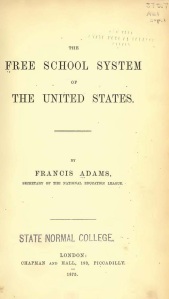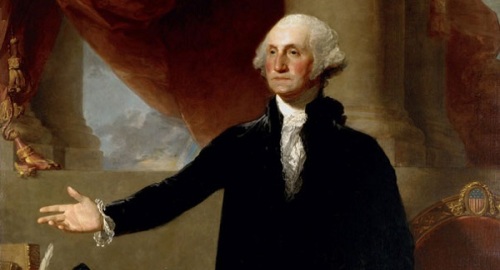Francis Adams, The Free School System of the United States (London, 1875)
by Kevin R. Kosar
 This book carries information on a broad range of aspects of America schools in the mid- and late-19th century. Chapters covers the structure of schooling systems, their cost and revenues therefore, attendance, religion and morals, teachers and their training, and curricula.
This book carries information on a broad range of aspects of America schools in the mid- and late-19th century. Chapters covers the structure of schooling systems, their cost and revenues therefore, attendance, religion and morals, teachers and their training, and curricula.
The author, who served as secretary of the UK’sNational Education League, also treats the topic of governmental relations (federal to state, state to local). These two quotes underscore the centrality of federalism in U.S. schooling.
The dread of “centralisation” which prevails throughout the States has had the effect of checking every movement for enlarging the powers of the National Government. The whole tide of public sentiment in America is in favour of a perfectly unfettered working of the State systems. (pp. 20-21)The annual meetings of the National Educational Association are attended by the most prominent educationists from all parts of the Union, and all topics affecting education are discussed. At the meeting of the Association held at
George Washington and the Federal Role In Education
by Kevin R. Kosar
The U.S. Constitution carries no explicit authorization for the federal government to have any role in education. Nevertheless, this did not preclude the nation’s first president from advocating the creation of federal civilian and military universities. George Washington made his case to Congress repeatedly, perhaps most forcefully in his eighth presidential address (1796):
I have heretofore proposed to the consideration of Congress, the expediency of establishing a National University; and also a Military Academy. The desirableness of both these Institutions, has so constantly increased with every new view I have taken of the subject, that I cannot omit the opportunity of once for all, recalling your attention to them…. Amongst the motives to such an Institution, the assimilation of the principles, opinions and manners of our Country men, but the common education of a portion of our Youth from every quarter, well deserves attention. The more homogeneous our Citizens can be made in these particulars, the greater will be our prospect of permanent Union; and a primary object of such a National Institution should be, the education of our Youth in the science of

